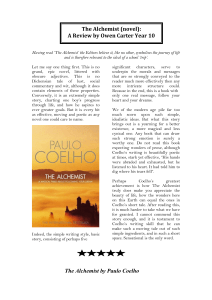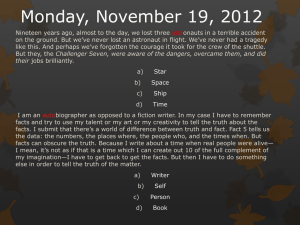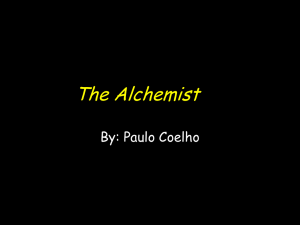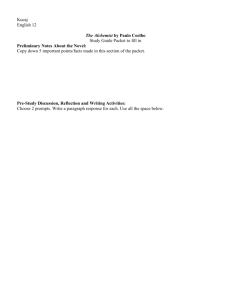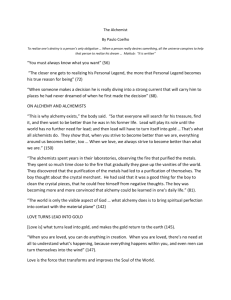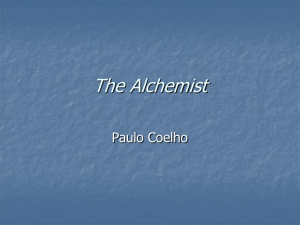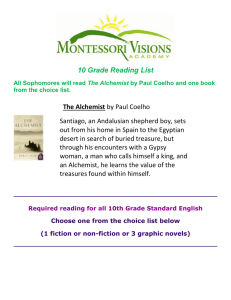In an interview, Paulo Coelho talks about “Four Pillars of Alchemy
advertisement
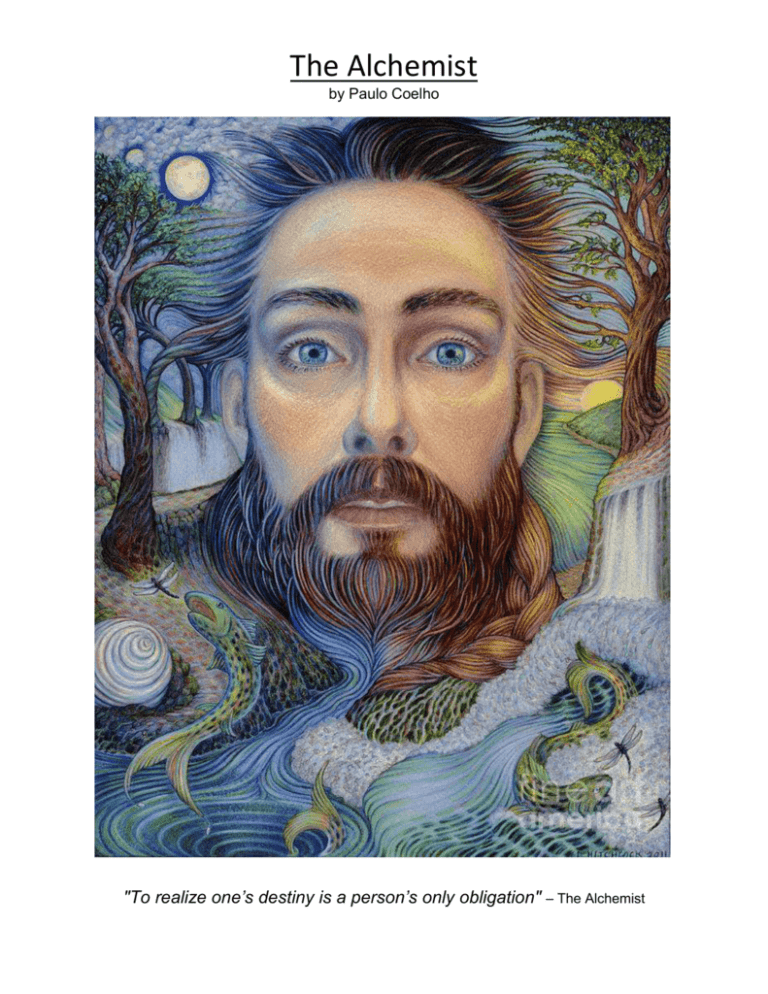
The Alchemist by Paulo Coelho "To realize one’s destiny is a person’s only obligation" – The Alchemist The Alchemist Reading Schedule Read to this Page Start of Novel Page 10* Page 33* Read Ahead……… Page 42* Page 47* Page 56* Read Ahead……… Page 65* Page 79* By This Date THURSDAY FRIDAY WEEK 1 5/8 1/23 MONDAY BLOCK DAY THURSDAY FRIDAY WEEK 2 5/13 MONDAY BLOCK DAY THURSDAY FRIDAY WEEK 3 5/20 Memorial Day… NO SCHOOL May 27th We’ll read 80-112 IN CLASS BLOCK DAY Read Ahead……… THURSDAY FRIDAY Page 116* Page 127* Page 132* Read Ahead……… Page 153* Page 163* END of Novel WEEK 4 5/28 MONDAY BLOCK DAY THURSDAY FRIDAY WEEK 5 6/3 MONDAY BLOCK DAY THURSDAY FRIDAY WEEK 4 6/10 Paulo Coelho was born in Rio de Janeiro, Brazil on August 24, 1947. Before becoming the most widely published Brazilian author of all time–publishing close to 100 million books–he worked as a theatre director, an actor and a journalist. In the 1970's, Coelho was also a successful songwriter whose songs were sung by such well-known brazilian singers as Elis Regina, Rita Lee and, most notably, Brazilian psychadelic rock pioneer Raul Seixas. Seixas and Coelho recieved wide commercial and critical acclaim for their songs "Eu Nasci Há Dez Mil Anos Atrás," "Gita," "Al Capone" as well as 60 other songs. Also during this time, Coelho travelled the world as part of the hippy movement and became more and more interested in Eastern religions as well as occultism in general. Coelho's definitive spiritual turn, however, came when he made a pilgrimage along the Camino de Santiago de Compostela, a catholic pilgrimage route in the north-western Spanish state of Galicia. This journey is documented in his book, The Pilgrimage (O Diário de um Mago), released in 1988. His next book was The Alchemist (O Alquimista), a book which he claims is a metaphorical adaptation of his own spiritual journey that he undertook on his pilgrimage. Clearly, the name of the protagonist in The Alchemist is a nod to Coelho's experience on the Camino de Santiago. While sales of The Alchemist were slow at first, it went on to become the highest-selling Brazilian book of all time and one of the most widely read books in the world. Since publishing The Alchemist, Coelho has gone on to publish other titles including Brida (1990), The Valkyries (1992), By the River Piedra I sat Down and Wept (1994), The Fifth Mountain (1996), Manual of a Warrior of Light (1997), Veronika Decides to Die (1998), The Devil and Miss Prym, (2000), Eleven Minutes (2003), The Zahir (2005), The Witch of Portobello (2006) and, most recently, The Winner Stands Alone (2008). In addition to his books, Coelho also has a weekly column which is published in several Brazilian newspapers and is syndicated internationally. Coelho is not only an internationally acclaimed author, but is also an outspoken activist for peace and social justice. He is a Messenger of Peace for the UN, an Ambassador to the European Union for Intercultural Dialogue, a Member of the Board of the Shimon Peres Institute for Peace, a UNESCO Special Counselor for “Intercultural Dialogues and Spiritual Convergences," and a Board Member of the Schwab Foundation for Social Entrepreneurship. He is also a member of the Brazilian Academy of Letters, the highest honor for a Brazilian author, and is one of the best-known authors to actively support the free distribution of his work. Paulo Coelho and his wife Christina split their time between Rio de Janeiro, Brazil and Saint Martin, Hautes-Pyrénées, France. Preliminary Notes about the Novel: The Alchemist is written in a fable format. What is a fable, and why would Coelho use it to tell his story? Generally speaking, fables use recognizable, simple characters and settings in order to illustrate a simple truth about life or human nature. What is it that Coelho attempts to teach? Even though you may not initially understand some of the unusual terminology in the story (Soul of the World, for example), its themes are ones which are probably familiar to you. Can you think of some old, familiar proverbs or songs that capture some of these ideas? For example, think about what ends up being more important for Santiago—the journey….or the destination??? Where is it that Santiago eventually finds happiness? People have been writing and singing about the answers to these questions for years! The novel integrates ideas and philosophies of many faiths and historical periods. Many of these ideas concern the pursuit of truth, one’s intended destiny and the attainment of personal happiness. Coelho refers to these combined elements as one’s “Personal Legend.” He tells the story of Santiago in order to teach us how we may find and live out our own Personal Legends. These ideas, though, have been explored since ancient times in one form or another by countless faiths and peoples. Hinduism, Buddhism, Islam, Taoism, Christianity, Judaism, countless tribal cultures, in addition to ancient and modern philosophers, all attempt to define the idea of one’s Personal Legend (though they may call it by different names), and all subscribe paths to achieving personal fulfillment. Thus, although the legend is about no faith or philosophy in particular, it is about all faiths and philosophies. Alchemy is the medieval “science” of transforming rocks into gold. Alchemy plays an important part in the plot (literal level) of the story, but it also becomes a symbol, or allegorical device, in the legend (figurative level). Coelho is really using characters, events and symbols as tools to show us how to achieve spiritual alchemy. In other words, how do we find or recognize the “gold,” -- our Personal Legend-- in the “rocks” of the everyday, ordinary, simple details of our lives? As Santiago discovers, sometimes the “gold” is not faraway, not glittery, not exotic, and not complicated, but it may require a journey of courage, faith and perseverance to discover what it is and where it is hidden. In an interview, Paulo Coelho talks about “Four Pillars of Alchemy– four important “tips” for finding one’s Personal Legend: 1. One must believe in “The Soul of the World.” The ancient Latin term for this concept is “anima mundi.” In short, this idea suggests that everything in the world is interconnected; that is, what one does affects everything else, from the smallest grain of sand to the largest whale, and vice versa. Writers and thinkers such as Plato, Walt Whitman and Khalil Ghibran have attempted to illustrate this interconnectedness in their works. 2. One must listen to the voice of the heart. Coelho suggests that sometimes we must follow our feelings and intuitions, even if we do not fully understand them. Through feeling one gains wisdom. 3. One must be faithful to one’s dreams, for they both test and reward us. In other words, the path to achieving one’s Personal Legend may not be an easy one, but we must endure the tests in order to gain the rewards. 4. One must “surrender oneself to the universe.” Coelho suggests that we must allow ourselves to be open to recognizing and learning from omens and signs which come our way. Main Character List Santiago - An adventurous young Andalusian shepherd determined to fulfill his Personal Legend, which is to find a treasure at the foot of the Egyptian pyramids. He is the book's protagonist. Melchizedek - The King of Salem. He appears to possess magical powers and helps those pursuing their Personal Legends. The Alchemist - A 200-year-old, extremely powerful alchemist residing in the Al-Fayoum Oasis. He dresses in black, rides a white horse, and carries a scimitar, the Philosopher’s Stone, and the Elixir of Life. He often speaks cryptically, but he understands the Soul of the World and the importance of Personal Legends. Crystal Merchant - A struggling merchant who owns a crystal shop on top of a desolate hill. His shop was once popular but lost much of its business as Tangier lost its status as Egypt’s premiere port town. He is a good-hearted, devout Muslim, but has a crippling fear of change. Englishman - A well-educated science student determined to learn the secrets of alchemy by learning from a true alchemist. He is a skeptic and loves reading his books. Fatima - A beautiful and chaste young "desert woman" who lives at the AlFayoum Oasis. She understands that she must allow Santiago to travel in pursuit of his dream. Glossary of Terms Alchemy The occult science which claims to be able to turn any common metal into gold. Bedouin Nomadic tribes that live in the African desert. Language of the Universe Omens, coincidences and dreams are the means by which the universe seeks to communicate. By remaining open to these omens, Santiago is able to learn more about the world and about himself. Levanter The name of the wind that blows off of Africa into Spain. So called because it comes from "the Levant." It is related to the conquest of Spain by the Moors. Santiago thinks that it brings the scent of exotic women and adventure. Maktub An Arabic word meaning "It is written." The shopkeeper uses it to refer to those thing preordained, or written, by Allah. Moor Spanish and European name for the Arabs that ruled the Iberian peninsula for almost 500 years. Personal Legend A Personal Legend is a true desire, which comes from the Soul of the Universe. This is different from other selfish desires in that the universe conspires to help you realize your personal legend. Scarab A type of desert beetle which was sacred to the Ancient Egyptians. They believed that it symbolized the Sun and spiritual rebirth. Simum A wind which blows through the desert and destroys everything in its path. A very strong sandstorm. Soul of the World A term which comes up repeatedly in the text, the Soul of the World is sometimes equated with God. It is a spiritual force that binds all of us together and governs all things and that speaks with us in the language of signs or omens. The Elixir of Life The Elixir of Life is the liquid portion of the Master Work, the goal of all alchemists. The Elixir of Life heals diseases and grants long life when ingested. The Alchemist carries some in a flask through the desert. The Master Work The Master Work is a term which refers, in alchemy, to the Elixir of Life and the Philosopher's Stone as a whole. The Master Work is the goal of all alchemists; the Alchemist has achieved it, but the Englishman is still seeking it. The Philosophers Stone The Philosophers Stone is the solid portion of the Master Work. The Philosopher's Stone has the ability to turn any metal into gold, an ability which the Alchemist uses to generate gold at the Coptic monastery in Egypt before taking his leave of Santiago. Zeal Extreme enthusiasm, can sometimes be used pejoratively in the case of calling one a "zealot."
